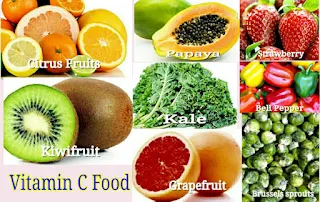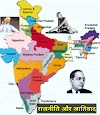Vitamin 'C' Rich Food
Vitamin & Minerals Required for Good Immune System
What is Immune System?
An organism's immune system is a network of biological processes that protects it from disease. It can detect and respond to a wide range of pathogens, including viruses, parasitic worms, cancer cells, and foreign objects like wood splinters, while separating them from the organism's own healthy tissue.
A healthy immune system needs a well-balanced diet over time. Healthy diets prepare the body ahead of time so that viruses, bacteria, and toxins do not invade it. Other lifestyle habits, such as daily exercise and adequate sleep, can help to prepare your body for the battle from diseases.
How can I boost my immune system?
- Please don't smoke.
- Consume a balanced diet rich in fruits and vegetables.
- Exercise on a daily basis.
- Maintain a balanced body mass index (BMI).
- If you do consume alcohol, do it in moderation.
- Make sure you get enough rest.
- Take precautions against infection, such as washing your hands regularly and thoroughly cooking meats.
- Drink plenty of water.
Certain foods can aid in the maintenance of a healthy immune system. The Immune System is kept intact by taking the following Basic Vitamins. With a few exceptions, it is preferable to obtain vitamins and minerals by food rather than medicine.
Vitamins for Healthy Immune System
1. Vitamin C
Vitamin C (also known as ascorbic acid or ascorbate) is a water-soluble vitamin that can be found in a variety of foods and is also used as a dietary supplement. Scurvy is a disease that can be prevented and treated with this supplement. Vitamin C is a necessary nutrient for tissue repair and the enzymatic synthesis of certain neurotransmitters. It is essential for immune system function and is needed for the function of several enzymes. It also functions as an antioxidant.
Almost all citrus fruits are high in vitamin C. With such a variety to choose from, it’s easy to add a squeeze of this vitamin to any meal.
Good sources of vitamin C include:
- Citrus Fruits like grapefruit, oranges, lemons, limes
- Amla (Indian Gooseberry)
- Kiwifruit
- Spinach.
- Kale.
- Bell peppers.
- Brussels sprouts.
- Strawberries.
- Papaya.
In fact, since vitamin C can be found in so many foods, most people do not need to take supplements unless their doctor recommends it. Before taking any vitamin C supplements, talk to your doctor.
2. Vitamin E
Four tocopherols and four tocotrienols are among the eight fat-soluble compounds that make up vitamin E. Vitamin E deficiency, which is uncommon and typically caused by a difficulty digesting dietary fat rather than a vitamin E-deficient diet, can cause nerve problems. Vitamin E is a fat-soluble antioxidant that prevents reactive oxygen species from damaging cell membranes.
Good sources of vitamin E include:
- Almonds.
- Peanuts/peanut butter.
- Sunflower seeds.
- Oils such as sunflower, safflower, and soybean oil.
- Hazelnuts.
- Avocado
- Wheat Germ Oil
- Fish
- Red Bell Pepper
- Amla (Indian Gooseberry)
3. Vitamin A
Retinol, retinal, and other provitamin A carotenoids are among the unsaturated nutritional organic compounds that make up vitamin A. (most notably beta-carotene). Vitamin A serves a variety of purposes, including growth and development, immune system maintenance, and healthy vision.
The retina of the eye requires vitamin A in the form of retinal, which when combined with the protein opsin forms rhodopsin, the light-absorbing molecule required for both low-light and colour vision. Retinoic acid (an irreversibly oxidised form of retinol) is an essential hormone-like growth factor for epithelial and other cells, and vitamin A plays a slightly different role.
Good Sources of vitamin A include:
- Carrots.
- Sweet potatoes.
- Pumpkin
- Amla (Indian Gooseberry)
- Butternut squash.
- Cantaloupe.
- Dark green leafy vegetables.
- Cheese
- Eggs
- Oily fish
- Fortified low-fat spreads
- Milk and yoghurt
4. Vitamin D
The synthesis of cholecalciferol in the lower layers of the skin epidermis through a chemical reaction that is based on sun exposure is the primary natural source of the Vitamin D (specifically UVB radiation). Dietary and supplement sources of cholecalciferol and ergocalciferol are available. Just a few foods naturally contain large quantities of vitamin D, such as the flesh of fatty fish.
Good sources of vitamin D include:
- Salmon.
- Mackerel.
- Tuna.
- Sardines.
- Red meat
- Liver
- Egg yolks
- Vitamin D fortified like milk, orange juice and cereals.
5. Folate/folic acid
Folate is a B vitamin that is also known as vitamin B9 or folacin. Since it is more stable during processing and storage, manufactured folic acid, which is converted into folate by the body, is used as a dietary supplement and in food fortification. Folate is needed by the body for the production of DNA and RNA, as well as the metabolism of amino acids required for cell division. Since humans cannot produce folate, it must be obtained via food, making it an essential nutrient. It can be found in a variety of foods. The recommended daily intake of folate for adults is 400 micrograms, which can be obtained from foods or dietary supplements.
Folate is the natural form, while folic acid is the synthetic form, both of which are often added to foods for their health benefits. Add more beans and lentils to your diet on a daily basis, as well as leafy green vegetables, to get more folate. Another delectable source is avocado. Folic acid is also used in fortified foods (check the label first).
Good sources of Folate include:
- Broccoli
- Brussels sprouts
- Leafy Green vegetables, such as Cabbage, Kale, Spring Greens and Spinach
- Peas
- Chickpeas and kidney beans
- Liver (but avoid this during pregnancy)
- Breakfast cereals fortified with folic acid
6. Iron
Iron is found in many foods, is added to certain foods, and can be purchased as a dietary supplement. Hemoglobin, an erythrocyte (red blood cell) protein that transports oxygen from the lungs to the tissues, requires iron to function. Iron promotes muscle metabolism and connective tissue health as a part of myoglobin, another oxygen-carrying protein. Iron is also required for physical development, neurological development, cellular function, and hormone synthesis.
Dietary iron is divided into two types: heme and nonheme. Nonheme iron is found only in plants and iron-fortified foods, while heme and nonheme iron are found in meat, fish, and poultry. In western populations, heme iron, which is produced when iron interacts with protoporphyrin IX, accounts for around 10% to 15% of total iron intake.
Good sources of Iron include:
- Red meat (limit to smaller amounts and less often).
- Chicken.
- Turkey.
- Red meat
- Canned sardines.
- Oysters.
- Clams.
- Mussels.
- Canned light tuna.
Good Sources of Iron for Vegitarian:
- Beans such as Red Kidney Beans, Edamame Beans and Chickpeas
- Nuts
- Dried fruit – such as dried apricots
- Soy bean flour
- Broccoli.
- Kale.
- Iron-fortified cereals.
7. Selenium
Selenium is a mineral that can be found in soil, water, and some foods. It is necessary for the proper functioning of many body processes.
Dietary selenium accounts for the majority of selenium in the body. The amount of selenium in food is determined by the environment in which it is produced or raised. Crab, liver, fish, poultry, and wheat are all excellent sources of selenium.
Selenium is used to treat selenium deficiency, an autoimmune condition that causes an underactive thyroid and high blood pressure during pregnancy. It's also used for heart and blood vessel disorders, such as stroke, statin drug side effects, and abnormal cholesterol levels, among other things, but there's no good clinical evidence to back up these claims.
Good Sources of Selenium Include:
- Brazil Nuts
- Seafood (tuna, halibut, sardines).
- Meat and liver.
- Poultry.
- Firm Tofu
- Cottage cheese.
- Whole Wheat Pasta
8. Zinc
Zinc is a trace element that is needed by humans, other mammals, plants, and microorganisms. Zinc is stored and transferred in metallothioneins, which are necessary for the function of over 300 enzymes and 1000 transcription factors. After iron, it is the second most common trace metal in humans, and it is the only metal found in all enzyme groups.
Zinc ions are often coordinated to the side chains of amino acids such as aspartic acid, glutamic acid, cysteine, and histidine in proteins. Theoretical and computational descriptions of zinc binding in proteins (and other transition metal binding) are difficult to come by.
Good Sources of Zinc Include:
- Legumes including lentils, beans, and chickpeas
- Baked beans.
- Yogurt.
- Nuts
- Seeds
- Oats
- Tofu
- Oysters.
- Crab.
Also Read:
Click here for Tulsi (Holi Basil) | Tulsi Medicinal Uses & Health Benefits
Click here for Mexican Mint | 10 Health Benefits of Indian Borage
Sadabahar (Madagascar Periwinkle) Medicinal uses & Benefits
Click here for Health Benefits & Nutrition of Moringa (Drumstick) Superfood.
Click here for Health Benefits & Nutrition Facts of flaxseed Superfood.
Click here for Health Benefits & Nutrition Facts of Sweet Potato Superfood.
Click here for Amla (Indian Gooseberry) Health Benefits and Nutrient.
Click here for Kiwi, the wonder fruit, Health Benefits & Nutrition of Kiwi
Click here for Ginger | Ginger Medicinal uses, Health Benefits & Nutrition
Click Here for health benefits of Tomatoes & nutrition Data
Click here for Covid-19 | Symptoms and Protection from Coronavirus.
Obesity | Obesity diet & tips for reducing weight
Watch Video on YouTube:
Immune System & Immunity, How to Boost Immunity?
--END--

















0 Comments